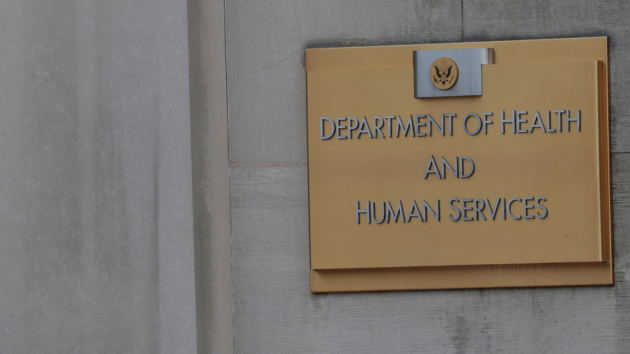Hispanic doulas work to meet needs of pregnant women as maternal mortality rates rise
Written by ABC Audio ALL RIGHTS RESERVED on October 12, 2023

(NEW YORK) — When Carolina Pino was pregnant, she discovered she lived in a so-called maternal care desert, a county with limited or no access to maternity care services.
Pino said the closest hospital where she could deliver her baby was more than 20 miles away, and the town where she lives in the San Francisco Bay Area had only one OB-GYN.
As a Hispanic woman, Pino said she especially wanted to find someone to guide her through her first pregnancy and childbirth with whom she related on a cultural level. So, Pino sought out a doula, a trained professional who provides support to moms before, during and after childbirth alongside doctors.
“Even though mothers are the ones going through the journey of delivering the baby, doulas contribute to keeping the environment more family-oriented,” Pino told “Good Morning America.” “So it’s not just that you’re in a hospital. You’re actually going through a transcendental time of welcoming your baby and starting a new family, becoming a mother.”
In Pino’s case, she found a Hispanic doula with whom she could not only communicate in Spanish, her first language, but who understood how she wanted her delivery to happen, which included a lot of family support.
Maria Antonieta Jandres, who also lives in the San Francisco area, said she too had a Hispanic doula in the delivery room with her during her 10-hour labor, someone with whom she could communicate in Spanish, her native language, and who made her feel safe and comfortable.
“My doula was so knowledgeable,” Jandres told “GMA.” “She spent 10 hours with me through my entire labor, and never left.”
After their own experiences giving birth with doulas by their side, both Pino and Jandres went onto become certified doulas themselves.
As doulas who are Hispanic, they are part of a growing movement in the San Francisco area and across the country to provide better support to Spanish-speaking women throughout pregnancy, during childbirth and postpartum through the use of doulas.
Both women work with Doulas Telar, a grassroots organization that offers free doula care to Latina immigrant women.
Like Jandres and Pino, all of the doulas who work with Doulas Telar are also Latina immigrant women themselves.
“Spanish is my first language so I can speak the language to these pregnant women that are going through the labor, the pain and also the stress that a labor can have by itself,” Jandres said. “Needing to communicate to a nurse that only speaks English or a midwife that only speaks English, it’s hard and the message is being displaced.”
Martha Franco created Doulas Telar in 2017 after seeing the need for Spanish-speaking doulas at hospitals in the San Francisco area. At the time, the organization provided volunteer doulas to women during delivery.
Now, the organization has expanded to include a center, Casa Doulas, where women can attend everything from free prenatal yoga classes to educational classes on topics like childbirth and breastfeeding. The doulas at the center offer support both before, during and after delivery, according to Franco.
“We become their family,” she said. “We come into their story and we want to know them so we can understand and support them not only as a doula, but as a family, as a human, so that they won’t feel they’re here by themselves.”
Diversifying care for pregnant patients through doulas
Part of the gap Franco said she and the doulas she works with are trying to fill is the lack of Hispanic health care workers in the United States, particularly in the maternal care sector.
A report released last year by the U.S. Health Resources & Services Administration found a “lack of racial and ethnic diversity” in the maternal workforce.” Specifically, the report found that Hispanics make up less than 8% of all maternal health physicians and less than 15% of maternal health registered nurses.
At the same time, over 80% of doulas in the U.S. are white, according to figures shared by the U.S. Department of Labor.
In June 2022, the Biden administration released a plan to reduce the maternal health crisis in the U.S. that called for increasing diversity in the maternal workforce. The plan cited doulas as a way to help both increase diversity and better support pregnant women, but noted there is a “short supply” of doulas that is compounded by an “exceptional lack of diversity in these professions and limited pathways for historically underrepresented communities to enter.”
The maternal health crisis the Biden administration seeks to address is one that is unique to the U.S., where around 700 women die each year from pregnancy-related complications, according to the Centers for Disease Control and Prevention, more than any other developed nation.
The crisis is one with huge racial disparities: Data released last year showed mortality rates nearly doubled among pregnant Hispanic women since March 2020, according to a study published by JAMA Network in June 2022.
Dr. Sheela Maru, an attending physician at NYC Health + Hospitals/Elmhurst and assistant professor at the Icahn School of Medicine at Mount Sinai, said immigrant women face additional disparities when it comes to maternal care.
“People who are not born in the United States, most of whom are of Hispanic origin, have a higher rate of maternal morbidity or near-misses, as well as pregnancy complications,” Maru told “GMA,” noting that many of the complications immigrant and minority pregnant women face come from a lack of respectful maternity care.
“About 1 in 5 moms describe mistreatment or violations of physical or verbal abuse during maternity care, and that number is even higher, about 30%, for Black, Hispanic and multiracial mothers,” Maru said, citing CDC data released in August. “Similarly, about 40% of Black, Hispanic and multiracial mothers experienced discrimination, and 45% reported holding back from answering questions or discussing concerns with their provider.”
Maru leads a joint initiative at Mount Sinai and NYC Health + Hospitals called the HoPE Doula Program, which provides free, community-based doula support to pregnant women at certain hospitals in New York. The doulas are matched with women based on their neighborhood, language and ethnicity.
The bridge doulas can build, according to Maru, is to be a voice for the patient in the delivery room and beyond.
“Even with excellent translation services and video translators and all the new technology that we have, nothing really replaces someone who is accompanying you, at your side, who speaks your own language and with whom you’re super comfortable when you’re in a medical setting,” she said. “That environment can be very scary and jarring and nothing really replaces that in-person accompaniment with someone you feel comfortable with.”
Anabel Rivera, a bilingual doula at Ancient Song Doula Services in New York City, said her experience of giving birth in the U.S. after moving from Puerto Rico motivated her to work as a community-based doula specializing in helping Hispanic women.
“I arrived to a completely new health care system. I was a Medicaid recipient, and the providers that I got were not responding to my questions. They couldn’t communicate in a cultural congruency towards me,” she said, noting that she believes the lack of communication led to a delayed diagnosis for preeclampsia, a pregnancy complication.
Now as a doula herself, Rivera said the most critical part of her job is to simply listen.
“The important thing is that we listen to their wishes, and not only that, but that we just listen to them,” she said. “When we’re working with a pregnant person or a birthing person, nobody knows best, just them, on what’s going on in their body, and treating someone with respect and listening is going to make a whole difference in their in their outcome.”
The struggle to recruit more Hispanic doulas, get fair pay
Both Rivera and Franco and her fellow doulas in San Francisco said the hardest part of their job is trying to recruit enough Spanish-speaking doulas to meet the need that exists across the country.
Currently, across all races, only around 6% of pregnant women receive doula care, according to a Department of Labor report on diversifying the doula workforce.
One of the biggest challenges, according to the doulas as well as Maru, is that doulas have traditionally not been well-compensated for the work they do, and it is a 24/7, unpredictable job in which they can only take on so many patients.
“We need space between client[s],” said Rivera. “We don’t want to leave someone unsupported through their journey … because then we will fall in the same circle of not being a solution, but being part of the problem.”
At Doulas Telar, Franco said the free doula services they offer to the community are a result of grants and donations. She said many of the organization’s doulas work in a volunteer capacity, most have other side jobs and many have other full-time jobs because they cannot live on a doula salary alone.
One of the biggest initiatives to help provide for doulas has been a push to have doula services adequately reimbursed by Medicaid and private insurers. Currently, fewer than one dozen states and the District of Columbia reimburse doula services through Medicaid, according to the Department of Labor.
“That has been an ongoing struggle, in terms of making sure that both people who need the services are able to afford them and obtain them at low or no cost, but then also that doulas are able to earn a living wage and be able to provide for themselves and their families and then provide high-quality care to their clients,” explained Maru.
Earlier this year, California became one of the latest states to offer doula reimbursement through its Medicaid program, a step that Franco and others said is slowly starting to help doulas in that state.
Franco has tried to ease another obstacle that blocks many Hispanic women from entering the doula field, the cost and lack of access to training, by offering free training classes at Doulas Telar, also supported by grants and donations.
The goal, she said, is to make sure that every Hispanic women who wants a doula has access to one.
“Nothing is going to stop us as long as the community needs us,” Franco said. “We always see more Latinas every time we go to take care of mothers. We want to go out there and let them know that we’re here and this is what we do.”
Copyright © 2023, ABC Audio. All rights reserved.

 KVSP
KVSP 




